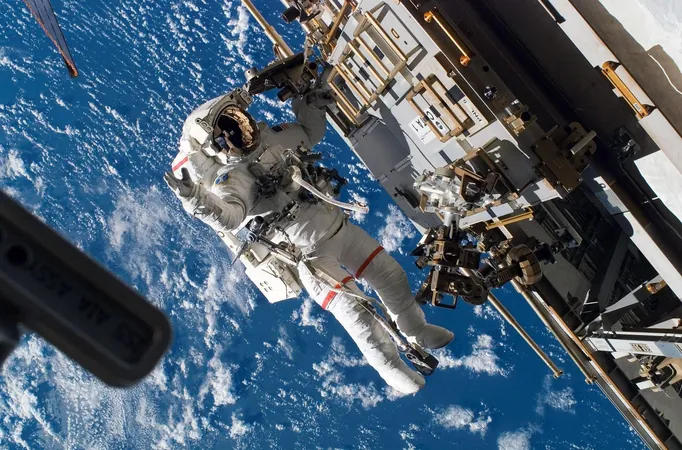
Space Debris Crisis: The 'Ticking Time Bomb' Endangering Astronauts and Satellites!
2024-10-08
Author: John Tan
Introduction
Decades of launching rockets and testing anti-satellite (ASAT) missiles have led to a dangerous increase in the amount of space debris surrounding Earth, creating a hazardous environment for astronauts and satellites. This 'ticking time bomb,' as described by Darren McKnight, Senior Technical Fellow at LeoLabs, threatens not just human spaceflight but also the intricate satellite systems crucial for daily life on Earth.
Urgent Need for Solutions
During an interview, Dr. McKnight, an expert in tracking spacecraft, emphasized the urgent need for solutions to this escalating issue, which he plans to address at the upcoming International Astronautical Congress in Milan. Esteemed space scholars from around the globe will gather to devise strategies aimed at safeguarding the future of space exploration.
Monitoring Space Debris
Dr. McKnight leads an elite team at LeoLabs, a Silicon Valley-based company that employs cutting-edge phased array radar technology to monitor more than 20,000 objects in low Earth orbit (LEO). This includes not only derelict rockets but also fragments from ASAT explosions. 'With the proliferation of rogue debris, collisions are not a question of if but when,' Dr. McKnight warned, indicating a pressing reality that space agencies must confront.
Risks from Small Debris
The founder of LeoLabs, Dan Ceperley, has also raised alarm regarding the potential disasters that could arise from small debris—fragments under a centimeter in size—which pose lethal risks to astronauts performing spacewalks or working outside their crafts. A telling incident occurred recently when a piece of shrapnel damaged the Canadarm2 robotic arm on the International Space Station (ISS), illustrating the invisible yet deadly nature of orbital debris.
Historical Context
The situation is exacerbated by past practices during the Space Race when the U.S. and the Soviet Union routinely discarded spent rocket stages into orbit, a practice that was never regulated. McKnight cites a near-miss incident in June 2022, where two large rocket bodies came dangerously close to colliding—just 500 meters apart—threatening catastrophic fragmentation.
Global Attention on Rogue Spacecraft
Among the 18 rogue Russian spacecraft still haunting LEO, McKnight pointed out, one was involved in that near-disaster. These unwieldy remnants are now on the radar of global space agencies, with calls to prioritize their removal.
Calls for Collaboration
Addressing this mounting threat, Ian Christensen from the Secure World Foundation advocated for collaborative efforts among major spacefaring nations to initiate debris remediation efforts. While some countries, like the UK and Japan, are advancing plans for active debris removal (ADR), the U.S., Russia, and China have yet to commit fully.
Legislative Efforts in the U.S.
Current studies and initiatives, such as the recently introduced ORBITS Act in the U.S. Senate—which seeks to allocate $150 million for the active remediation of space debris—offer a glimmer of hope. Though not yet passed, the bill demonstrates a growing recognition of the problem as the space economy is poised to surpass $1 trillion by 2040.
Innovative Solutions
Exciting developments are on the horizon, as cutting-edge research presented at the IAC will explore sophisticated methods to capture and deorbit such hazardous space debris. In an innovative collaboration involving researchers from the University of Bern and MAXAR, unprecedented high-resolution images of large rocket stages are being utilized to plan potential capture missions.
Future Visions for Space Debris
Additionally, renewable visions for heavenward technologies emerge from industry leaders like Jeffrey Manber of Voyager Space, who aims to repurpose discarded rockets into functional modules for future space stations, turning space debris into valuable assets in the process.
Conclusion
The time for action is now—will the global space community step up to face the 'ticking time bomb' before it's too late?


 Brasil (PT)
Brasil (PT)
 Canada (EN)
Canada (EN)
 Chile (ES)
Chile (ES)
 España (ES)
España (ES)
 France (FR)
France (FR)
 Hong Kong (EN)
Hong Kong (EN)
 Italia (IT)
Italia (IT)
 日本 (JA)
日本 (JA)
 Magyarország (HU)
Magyarország (HU)
 Norge (NO)
Norge (NO)
 Polska (PL)
Polska (PL)
 Schweiz (DE)
Schweiz (DE)
 Singapore (EN)
Singapore (EN)
 Sverige (SV)
Sverige (SV)
 Suomi (FI)
Suomi (FI)
 Türkiye (TR)
Türkiye (TR)